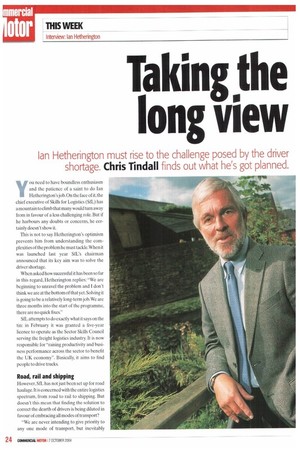Taking the long view
Page 24

Page 25

If you've noticed an error in this article please click here to report it so we can fix it.
Ian Hethenngton must rise to the challenge posed by the driver shortage. Chris Tindall finds out what he's got planned.
you need to have boundless enthusiasm and the patience of a saint to do Ian Hetherington's job. On the face of it, the chief executive of Skills for Logistics (Sit) has a mountain to climb that many would turn away from in favour of a less challenging role. But if he harbours any doubts or concerns, he certainly doesn't show it.
This is not to say Hetherington's optimism prevents him from understanding the complexities of the problem he must tackle.When it was launched last year SfL's chairman announced that its key aim was to solve the driver shortage.
When asked how successful it has been so far in this regard, Hetherington replies: "We are beginning to unravel the problem and I don't think we are at the bottom of that yet. Solving it is going to be a relatively long-term job. We are three months into the start of the programme, there are no quick fixes."
SfL attempts to do exactly what it says on the tin: in February it was granted a five-year licence to operate as the Sector Skills Council serving the freight logistics industry. It is now responsible for "raising productivity and business performance across the sector to benefit the UK economy". Basically, it aims to find people to drive trucks.
Road, rail and shipping
However, Sit has not just been set up for road haulage. It is concerned with the entire logistics spectrum, from road to rail to shipping. But doesn't this mean that finding the solution to correct the dearth of drivers is being diluted in favour of embracing all modes of transport?
"We are never intending to give priority to any one mode of transport, but inevitably there's more resources going into road," Hetherington concedes. "There are 1.7m people working in UK logistics and, whatever way you look at it, 800,000 are directly involved in haulage at one level or another."
Hetherington was previously chief executive of SfL's predecessor, the Road Haulage Distribution Training Council. He says it was a very different organisation:"SfL is delivering far, far better value for money. It's far more assertive in terms of stamping our mark. And in terms of delivering the equivalent functions there's no comparison with the ambition."
Big ambitions often need big money. Hetherington says SfL's budget this year is £4.9m, but it will "increase significantly" next year; although it's still in its early stages.A marketing campaign to highlight what it is doing and how it can provide advice to operators began in June. According to Hetherington, this relies fairly heavily on direct mailing and a lot of face-to-face contact. It will increasingly target and work with trade associations, and also organisations beyond that, such as the Cold Storage and Distribution Federation.
Too late for WTD
But for all his optimism-and Hetherington has that in bucketloads does he think SfL was set up too late to deal with and limit the less beneficial effects of the Working Time Directive, which comes into force in March?
"We can't have an input in it," he accepts. "But I think we can probably do a lot more in terms of responding to it rather than preparing people for it. Of course, it's going to have an impact on wages. [But] it isn't naive to say it will have a positive improvement on wages and conditions and will have a beneficial effect on recruiting and retaining."
He follows up these comments with a scathing attack on the inability of Further Education (FE) colleges to provide courses which respond to demand rather than, as he sees it, where lecturers' interests lie.
"The FE sector is slow to the point of being grossly negligent," he complains. "Traditionally the providers of education have been focusing on delivering what they find easy to deliver, not on where the demand was from. If there was an economics lecturer in a college there will be more courses on econotnics.That's how they operate and how they are funded."
Hetherington says he intends to launch a campaign group charged with placing the demand component high up on college agendas and cites Bristol College as "a beacon we are seeking to replicate". It surrounded itself with nine specialist training sup pliers from its region, which brought with them links to local companies.
"We focus on Bristol because the principal is very enlightened. If the money can be redirected to meet the demands of employers, colleges will change their habits and adapt,Hetherington says.
Fle is also keen to promote opportunities for women and ethnic minorities in the industry. Despite recognising that there are many women already working in haulage, Hetherington says it is a potential workforce that has yet to be fully tapped.
"We are starting to develop positive images in the industry, and then lead by example. We will be identifying those jobs where perhaps employment of women is easier and potentially more beneficial." With ethnic minorities, he admits it will be "much more challenging", but the same principle applies: -Sell the opportunity and provide a convincing case a genuine opportunity for people in this industry."
Standard skill set
But it's when discussing SfL's overall plan for implementing a standard set of skills for the sector -"the big one"that the chief executive really comes alive. And although his explanation sounds a little woolly at the moment, I leave in no doubt that Hetherington is determined to see his idea through to fruition.
"There will be a lot of steps,I don't know how many yet, 10, 12, 13 maybe. We will work with the 11 supply chains, with key employers in there, to establish where the skills fit on this 'ladder'. We will finish up with a single ladder that will bring in more than 100 key companies across the sector that have had an input. We will then take this ladder and translate it and influence public policy."
But his vision doesn't end there: "We will need to change the shape of foundation degree delivery, change the shape of apprenticeships, change the shape of school curriculum and so on.All on the back of having 100 key companies making demands on the government and the agencies. Once we get that right we can then claim to really have had an effect on universities, schools and FE colleges."
And then, maybe realising the scope of what he is suggesting, Hetherington concludesi-This will not happen overnight; it's maybe two-anda-half to three years' work. It's a step change from where we are now and involves a very significant increase in investment.
"There will always be a battle for investment, but there's no point doing this unless the investment is in place." •






























































































































































































